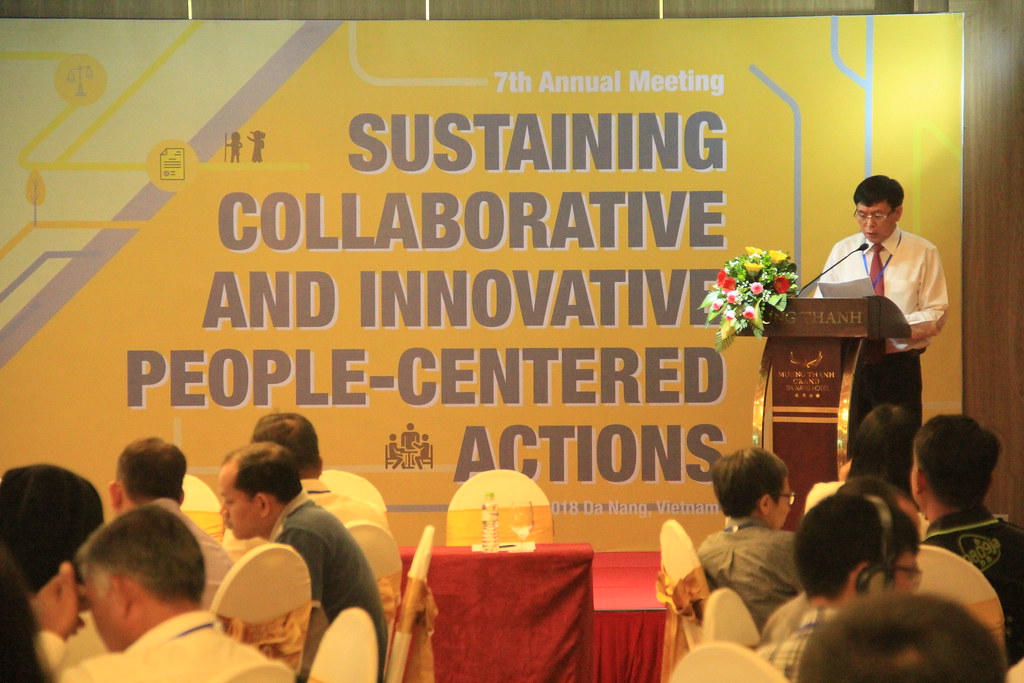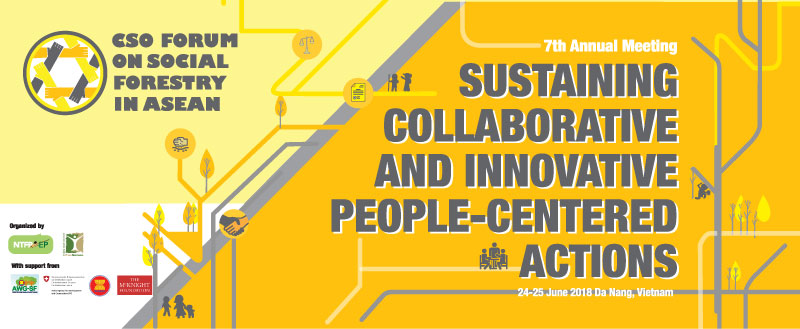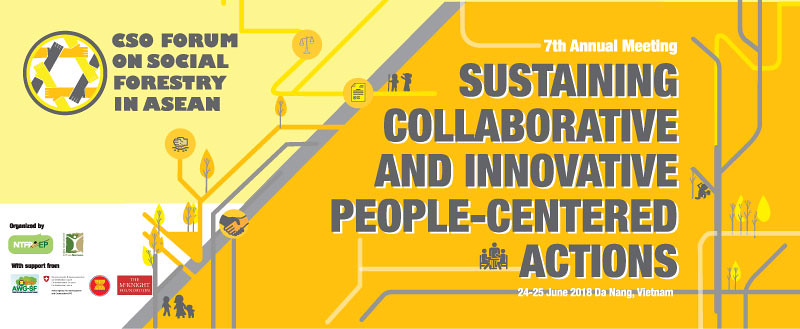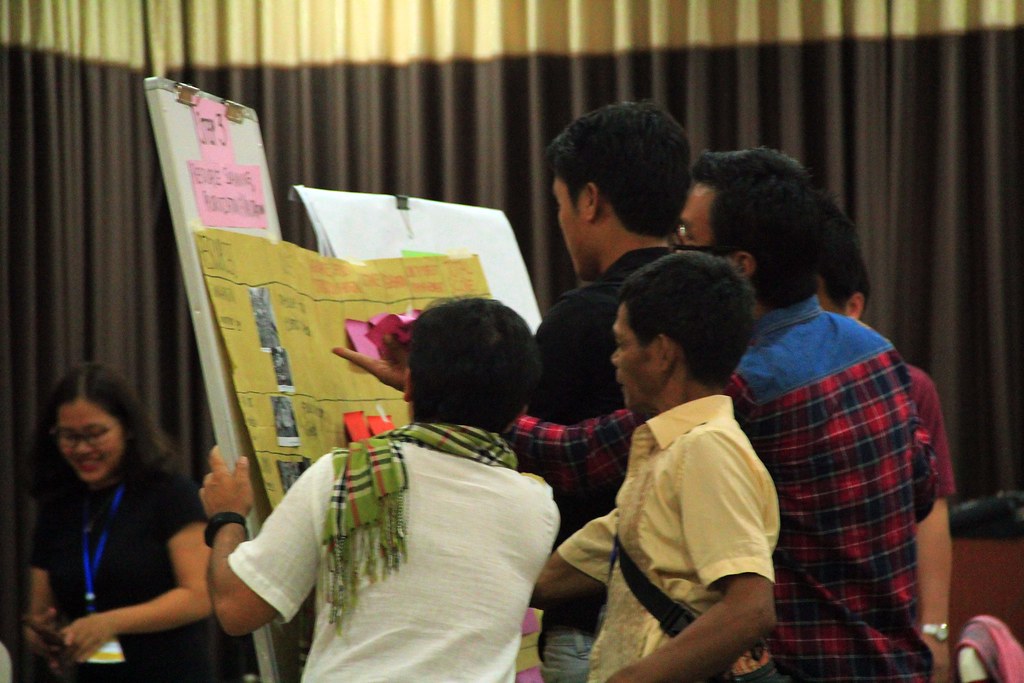DA NANG, Vietnam – Over 80 representatives from ASEAN civil society, local communities, and forest stakeholders are gathered in the 7th Annual Meeting of the Civil Society Organizations Forum on Social Forestry in ASEAN (CSO Forum) on 24-25 June 2018 in Central Vietnam with the theme ‘Sustaining Collaborative and Innovative People-Centered Actions.’
As purveyors of traditional knowledge and protectors of resources, indigenous peoples and local communities living in and around forests hold crucial roles in forest management schemes. The rich experiences and innovations of the civil society could contribute greatly to pivotal trends and movements from the local to the global that will ensure to the bigger sustainability picture: the ASEAN Plan of Action on Social Forestry, ASEAN Strategic Plan of Action on Forestry, ASEAN commitments and support to Nationally Determined Contributions, and the 2030 Sustainable Development Goals.
Over the last seven years, the CSO Forum has been pivotal in linking issues, lessons, and experiences from the ground to key regional bodies such as the ASEAN Working Group on Social Forestry (AWG-SF), the ASEAN Senior Officials on Forestry (ASOF), and potentially to other relevant regional and international intergovernmental and multi-stakeholder bodies and fora.
While several challenges and issues need to be resolved, it was through the CSO Forum that critical bottlenecks have been identified and discussed at the regional level. For example, the CSO Forum has pushed the envelope in discussing gaps in addressing the vulnerabilities of communities, the importance of traditional knowledge, and the recognition of tenure of many indigenous and local communities.
Assessing its previously affirmed goals and objectives, the CSO Forum has drafted a ‘report card’ that provides an overview of social forestry from the civil society perspective. It is through its 7th Annual Meeting that the CSO Forum will decide on the succeeding steps in sustaining itself as an effective platform towards a people-centered social forestry and climate change mitigation and adaptation in ASEAN.
DAY 1
In Indonesia, forest conversion has been changing Sumatran forests since the 1970s. Its unique typology and diverse wildlife provide crucial social and cultural benefits for indigenous communities like the Orang Rimba. However, pressures from various industries like industrial timber plantation, oil palm plantations and open-pit mining continue to drive pressures into Bujang Raba.
Putri Pratami of KKI Warsi along with 80 other civil society representatives engaged in knowledge exchange through inspiring stories of challenges, opportunities, and success like the experience of Bujang Raba during the first day of the 7th Annual Meeting of the CSO Forum.
Participants from 8 countries from Southeast Asia have affirmed their perspective on social forestry in the region through the ‘CSO Report Card.’
It was until local communities in Bujang Raba decided to formalize their management over their resources through the Hutan Desa scheme and KKI Warsi initiated the REDD-plus project in 2012.

Bujang Raba landscape, courtesy of KKI Warsi
Results from the monitoring studies conducted in 5 villages in Bujang Raba from 2013-2016 have been remarkable. Not only was there zero deforestation within the engagement period; Bujang Raba was able to reduce emission up to 100%, going beyond the target of 75%, certifying carbon emissions of 10,000 ton CO2eq.
Monitoring plays an important part in the operationalization of governance mechanisms. Staying true to its knowledge-sharing core, the CSO Forum has shared skills and tools such as forest monitoring that are useful in addressing challenges and tapping opportunities in four key thematic areas: community economy & livelihoods, forest tenure and access rights, governance mechanisms, and safeguards.
Cases of collaboration like that of in Bujang Raba continue to inspire neighboring communities in the region: the passion of local communities to sustainable manage their forest resources; the openness of the government in awarding rights to implement community-based forest management schemes in the landscape; and the active involvement of the civil society.
These stories shared in the 7th Annual Meeting of the CSO Forum parallel existing initiatives and success stories happening simultaneously in many parts of the region.
DAY 2
“The interface between the government and civil society in advancing social forestry has been productive in building and sharing capabilities,” said Dr. Nguyan Phu Hung, AWG-SF Focal Point of Vietnam and Director of Technology and International Cooperation/VNFOREST Ministry of Agricultural and Rural Development (MARD) on the opening of the second day of the 7th Annual Meeting of the CSO Forum.
 Dr. Nguyen Phu Hung, AWG-SF Focal Point of Vietnam
Dr. Nguyen Phu Hung, AWG-SF Focal Point of Vietnam
With the need to expand discussion spaces, the second day of the CSO Forum has been set-up as a dialogue seminar to make tacit the rich and diverse social forestry knowledge-base. Trinh Le Nguyen, Executive Director of PanNature, fittingly expressed how “social forestry is understood differently in different places, and practiced in various ways and methods.” Social forestry, while it is generally understood as an integration of the capacities of local communities in sustainable forest use and management, manifest its complexities in practice. This results to variations both in direct and indirect policy and legal responses by various states.
However, groundbreaking changes have been surfaced by their civil society counterparts in the CSO Forum. There is an increasing trend to put in place systems that incorporate the protection of biodiversity, understanding traditional ways of managing forest resources, providing maximum benefits for local communities, and making use of existing mechanisms.
Concrete actions on the ground have shown that initiatives on community economy and livelihoods have helped in recognizing the key role of communities in forest management. Connecting these to opportunities could potentially contribute to its sustainability. One windows of opportunity most especially for community forest enterprises who often worked in isolation is the growing interest in ‘green’ and sustainable products the ASEAN Economic Community.
Many state policies are moving towards the recognition of tenurial and rights of communities as forest managers and owners as seen in the cases presented in the CSO Forum: of customary forests, hutan adat in Indonesia, tagal hutan in Malaysia, spirit forests in Malaysia, and forest shifting cultivation in Myanmar. Although responses by the respective state actors have been varied, they nonetheless signify progressive movements.
There is an increasing number of established multi-stakeholder social forestry groups in ASEAN Member States. Similarly, there exists parallel streams of projects and programmes on strengthening social forestry in the region that, when harmonized, could contribute to the capacities and functions of these multi-stakeholder groups. Expanding the capacities of these working groups in aspects like documentation and resolution could help operationalize stronger governance mechanisms.
While safeguard mechanisms such as FPIC, the Paris Agreement, and intellectual property rights protocols, a major challenge posed to the region still is to develop put in place safeguard measures that do not only avoid harm but also bring benefits to the communities.
The complexities of realizing a people-centered forestry entails complex responses both from the government and civil society. While there is much to do in fulfilling a responsive sector that engages, empowers, and provides benefits for forest-dependent communities in the region, today, more than ever, the momentum has been set for a more conducive cooperation.
For more information, contact:
Dazzle Labapis, CSO Forum Facilitator, NTFP-EP Asia: dazzle.labapis@ntfp.org
Links to the presentations have been uploaded here.
Live video courtesy of PanNature:
Earl Diaz, NTFP-EP Asia






